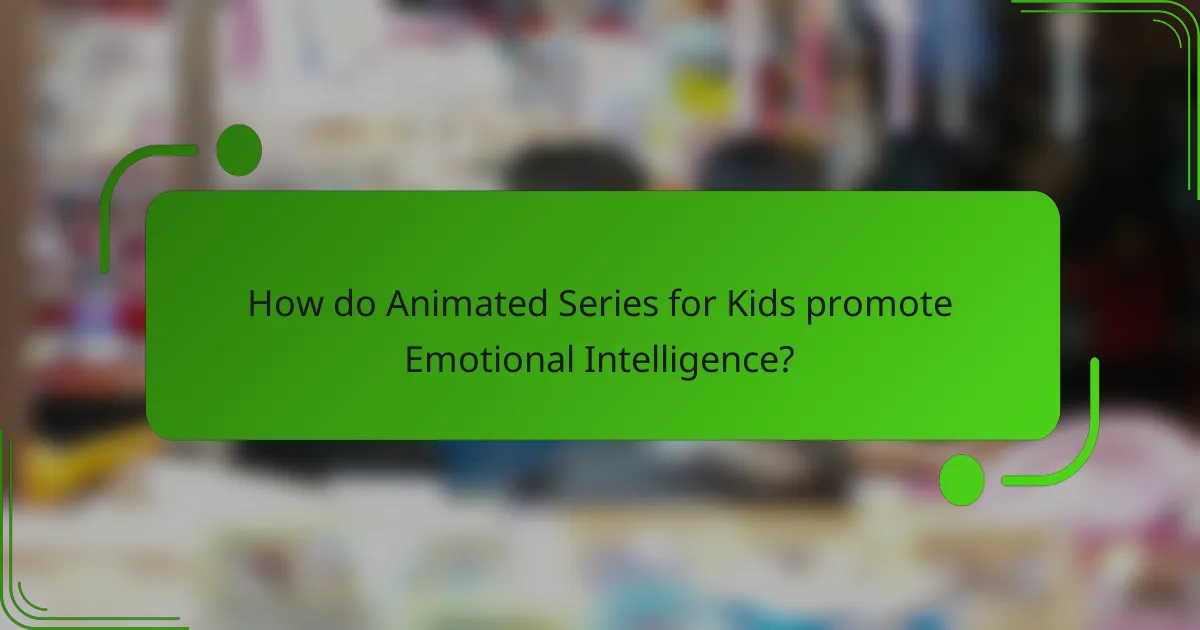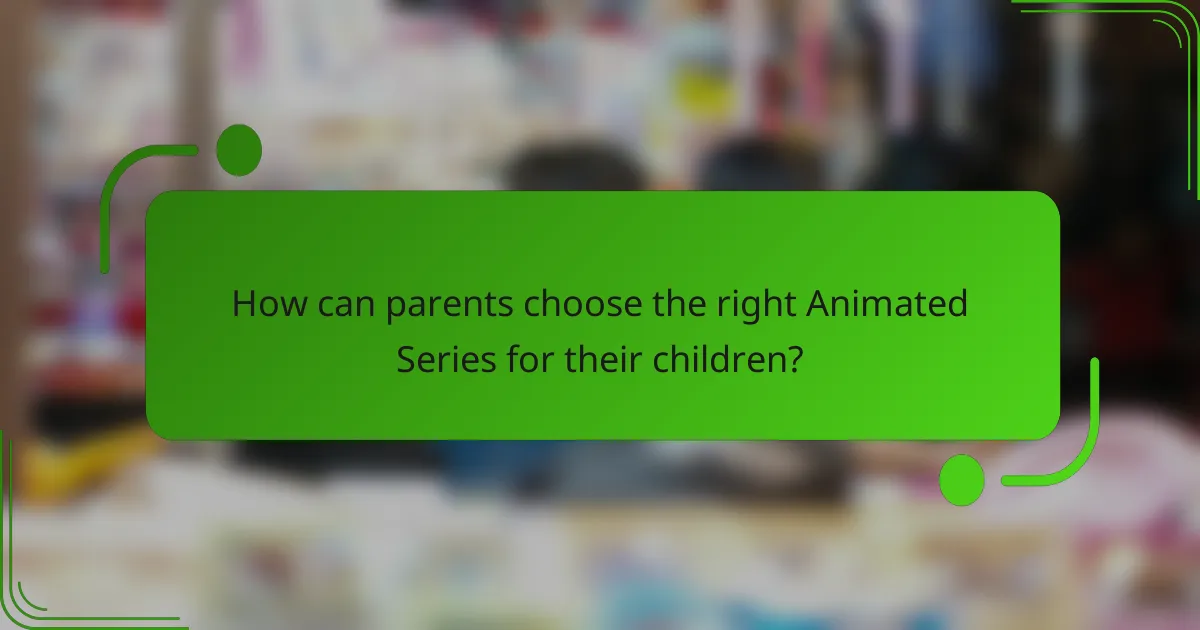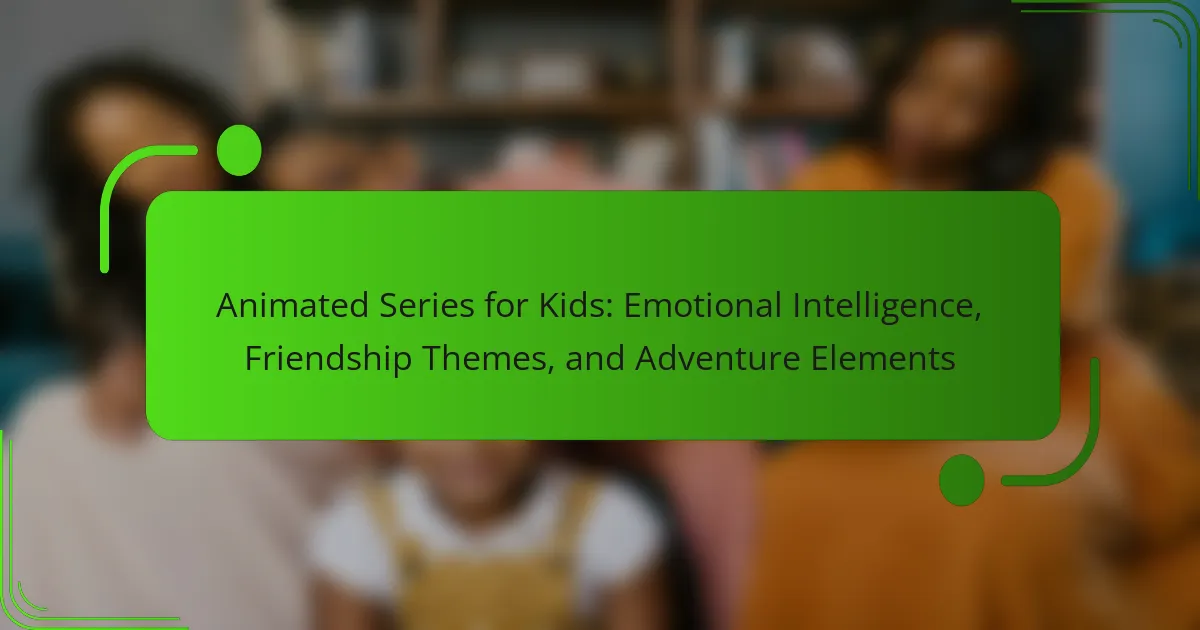Animated series for kids are television programs designed specifically for a young audience, featuring colorful characters and engaging storylines that entertain and educate. These series often explore themes such as friendship, adventure, and emotional intelligence, helping children develop essential social skills and emotional awareness. Research indicates that animated shows can positively impact children’s emotional development by depicting relatable characters and situations that encourage empathy and problem-solving. Additionally, adventure elements within these series promote creativity and resilience, as characters face challenges that test their friendships and teamwork. Parents can select suitable animated series by evaluating age appropriateness, educational value, and thematic content, ensuring a beneficial viewing experience for their children.

What are Animated Series for Kids?
Animated series for kids are animated television programs specifically designed for a young audience. These series often feature colorful characters and engaging storylines. They aim to entertain while also educating children on various themes. Common themes include friendship, adventure, and emotional intelligence. Animated series can vary in format, including short episodes or longer story arcs. Popular examples include “Paw Patrol” and “Peppa Pig.” Research shows that these series can positively influence children’s social skills and emotional development.
How do Animated Series for Kids differ from other forms of entertainment?
Animated series for kids differ from other forms of entertainment primarily through their focus on educational content and character development. They often incorporate themes of emotional intelligence, teaching children how to recognize and manage feelings. This is distinct from many [censured]-oriented shows that may prioritize humor or drama over educational values.
Additionally, animated series frequently emphasize friendship and teamwork. Characters often solve problems collaboratively, reinforcing social skills. This contrasts with other entertainment forms that may not highlight such themes as prominently.
Moreover, animated series use vibrant visuals and engaging storytelling to capture young audiences’ attention. This visual appeal is often more pronounced than in live-action formats aimed at older demographics.
Research indicates that children learn better through animated content due to its ability to simplify complex ideas. For example, a study published in “The Journal of Educational Psychology” shows that animation enhances comprehension in young viewers.
Overall, animated series for kids uniquely blend education, emotional growth, and entertainment in a way that sets them apart from other entertainment forms.
What are the unique characteristics of Animated Series for Kids?
Animated series for kids often feature vibrant colors and engaging animation styles. These series typically include relatable characters that resonate with young audiences. Storylines often revolve around themes of friendship, teamwork, and emotional intelligence. Humor is a common element, making the content entertaining while educational. Many series incorporate moral lessons, teaching values such as kindness and empathy. Episodes usually have a simple structure, making them easy to follow. They often include catchy songs or memorable catchphrases that enhance viewer engagement. Additionally, animated series for kids frequently use fantasy or adventure elements to spark imagination.
Why are Animated Series for Kids important in childhood development?
Animated series for kids are important in childhood development because they foster emotional intelligence and social skills. These series often depict various emotions and conflict resolutions, helping children understand their own feelings. Research shows that children who engage with animated narratives develop empathy by identifying with characters’ experiences. Additionally, friendship themes in these series teach cooperation and teamwork. Adventure elements encourage creativity and problem-solving skills. According to a study by the American Academy of Pediatrics, media content can significantly influence children’s social development. Thus, animated series serve as valuable tools for learning and growth during formative years.
What themes are commonly explored in Animated Series for Kids?
Animated series for kids commonly explore themes of friendship, adventure, and emotional intelligence. These series often depict characters forming bonds and navigating social dynamics. Adventure themes encourage exploration and problem-solving. Emotional intelligence is highlighted through characters managing feelings and empathy. These elements foster learning and growth in young viewers. Research shows that such themes help develop social skills and resilience in children. For instance, studies have indicated that narratives involving friendship can enhance cooperation and understanding among peers.
How do emotional intelligence themes manifest in these series?
Emotional intelligence themes manifest in these animated series through character development and interpersonal relationships. Characters often face challenges that require them to recognize and manage their emotions. For example, they may experience conflict with friends, leading to lessons on empathy and communication. These series frequently depict scenarios where characters must understand others’ feelings to resolve disputes. Story arcs often focus on the importance of teamwork and collaboration. This fosters skills like conflict resolution and emotional regulation. Additionally, characters model self-awareness by reflecting on their actions and their impact on others. Such representations help young viewers learn about emotional responses in various situations.
What role do friendship themes play in the narratives?
Friendship themes play a crucial role in narratives, particularly in animated series for kids. They foster emotional connection and character development. Through friendships, characters often face challenges and learn valuable lessons. These themes promote values such as loyalty, empathy, and teamwork. For instance, characters who support each other demonstrate resilience. Studies show that children learn social skills through these narratives. This reinforces the importance of friendships in real-life situations. Ultimately, friendship themes enhance the storytelling experience and contribute to emotional intelligence in young viewers.
How are adventure elements integrated into the storylines?
Adventure elements are integrated into storylines through quests, challenges, and exploration. Characters often embark on journeys that require problem-solving and teamwork. These adventures typically involve overcoming obstacles that test their skills and resilience. The narratives often include fantastical settings that spark imagination. Conflicts arise that require characters to confront fears or adversaries. Each adventure usually culminates in a lesson about friendship or personal growth. For example, shows like “Adventure Time” feature characters facing moral dilemmas during their quests. This blend of adventure and emotional lessons engages young audiences while promoting emotional intelligence.

How do Animated Series for Kids promote Emotional Intelligence?
Animated series for kids promote emotional intelligence by depicting relatable characters and situations. These series often showcase emotions like happiness, sadness, and anger. Characters navigate social interactions, teaching children empathy and understanding. Storylines frequently involve conflict resolution, encouraging problem-solving skills. Research indicates that children who engage with these series demonstrate improved emotional awareness. For example, a study by the University of California found that children who watched empathetic characters were more likely to exhibit prosocial behavior. Moreover, animated series often incorporate lessons on friendship and cooperation, further enhancing social-emotional learning. These elements collectively foster emotional intelligence in young viewers.
What skills related to Emotional Intelligence are taught through these series?
The skills related to Emotional Intelligence taught through these series include self-awareness, empathy, and social skills. Self-awareness involves recognizing one’s own emotions and their impact on behavior. Empathy is the ability to understand and share the feelings of others. Social skills encompass effective communication, conflict resolution, and building relationships. These series often depict characters navigating social situations, demonstrating how to express feelings appropriately. They provide scenarios where characters practice empathy by helping friends in need. Research shows that children exposed to Emotional Intelligence skills develop better interpersonal relationships and emotional regulation.
How do characters model empathy and understanding?
Characters model empathy and understanding through their actions and interactions. They often demonstrate compassion by recognizing and responding to the feelings of others. For instance, a character may comfort a friend who is sad, showing they understand their pain. This behavior teaches young viewers the importance of emotional support. Additionally, characters frequently engage in active listening, which allows them to grasp different perspectives. This technique fosters a sense of connection and validation among peers. In many animated series, conflicts are resolved through dialogue, highlighting the value of communication in understanding others. These portrayals encourage children to practice empathy in their own lives.
What scenarios in the series help children navigate their own emotions?
Scenarios in the series that help children navigate their emotions include characters experiencing loss, conflict, and joy. For instance, when a character loses a beloved pet, it illustrates grief. This scenario allows children to understand and process their own feelings of sadness. Another example is a conflict between friends, which teaches conflict resolution and empathy. Characters often express their feelings openly, demonstrating healthy emotional communication. These scenarios provide relatable situations that encourage children to reflect on their emotions. By observing characters’ reactions, children learn coping strategies. The series effectively models emotional intelligence through these relatable experiences.
How do friendship themes enhance social skills in children?
Friendship themes enhance social skills in children by promoting communication, empathy, and cooperation. These themes encourage children to express their feelings and thoughts. They also teach children to understand others’ perspectives. Engaging with friendship narratives helps children practice conflict resolution. For example, characters facing challenges together model teamwork. Research shows that children who engage with friendship themes exhibit improved interpersonal skills. A study by Rose and Asher (2010) found that children with strong friendships tend to have better social competence. Thus, friendship themes serve as valuable tools for developing essential social skills in children.
What lessons about teamwork and cooperation are presented?
Animated series for kids often present valuable lessons about teamwork and cooperation. Characters frequently demonstrate the importance of working together to achieve common goals. These shows highlight that diverse skills contribute to success. They also teach that communication is essential for effective collaboration. Conflict resolution is another key lesson, showing how disagreements can be resolved through dialogue. Additionally, the series often portray the significance of trust among team members. Characters learn to rely on each other, fostering a sense of unity. Ultimately, these narratives reinforce that cooperation leads to greater accomplishments.
How do conflicts among friends contribute to character development?
Conflicts among friends contribute to character development by fostering emotional growth and resilience. When friends face disagreements, they learn to navigate complex emotions. This process encourages empathy as they consider each other’s perspectives. Conflict resolution also builds communication skills, essential for healthy relationships. Additionally, overcoming challenges together strengthens bonds and instills a sense of teamwork. Research shows that characters in animated series often grow through these experiences, reflecting real-life social dynamics. Such portrayals help young viewers understand the value of conflict in personal growth.

What are the Adventure Elements in Animated Series for Kids?
Adventure elements in animated series for kids include exploration, challenges, and teamwork. These series often feature characters embarking on quests or journeys. Characters face obstacles that require problem-solving skills. Friendships are tested through these adventures, promoting social skills. The settings are often imaginative and diverse, enhancing engagement. Action sequences contribute excitement and keep viewers interested. Moral lessons are frequently woven into the narratives, teaching values. Overall, these elements foster creativity and resilience in young audiences.
How do adventure elements engage children in storytelling?
Adventure elements engage children in storytelling by capturing their imagination and fostering active participation. These elements introduce excitement and unpredictability, which stimulate curiosity. Children are drawn to challenges and quests, encouraging them to think critically and problem-solve. Adventure stories often feature relatable characters, making it easier for children to connect emotionally. Research shows that interactive storytelling enhances cognitive development, as children learn to navigate narratives. A study published in the Journal of Child Psychology found that children exposed to adventure narratives demonstrated improved empathy and emotional intelligence. Adventure elements create a dynamic environment that promotes engagement and learning.
What types of adventures are commonly depicted?
Commonly depicted adventures in animated series for kids include quests, explorations, and problem-solving scenarios. Quests often involve characters seeking a specific goal or treasure. Explorations take characters to new worlds or environments, fostering curiosity. Problem-solving scenarios require characters to overcome obstacles, teaching critical thinking. These adventures encourage teamwork and friendship. They also promote emotional intelligence by addressing challenges and emotions. Series like “Adventure Time” and “Dora the Explorer” exemplify these adventure types. These shows engage children while imparting valuable life lessons.
How do these adventures encourage problem-solving skills?
Adventures in animated series for kids encourage problem-solving skills by presenting challenges that require critical thinking. Characters often face obstacles that demand creative solutions. For instance, they may need to work together to overcome a villain or navigate a tricky situation. This collaboration fosters teamwork and communication. The narrative structure typically includes a problem, a series of attempts to solve it, and eventual resolution. This pattern teaches children to analyze situations and devise strategies. Research shows that engaging in such problem-solving scenarios enhances cognitive development in children. According to a study by the American Psychological Association, children who engage in problem-solving activities demonstrate improved reasoning skills and adaptability.
What impact do adventure themes have on children’s imagination?
Adventure themes significantly enhance children’s imagination. These themes encourage creative thinking and problem-solving. Children engage in imaginative play inspired by adventure narratives. This type of storytelling promotes exploration of new ideas and scenarios. Research indicates that imaginative play fosters cognitive development. According to a study by the American Psychological Association, children exposed to adventure themes exhibit increased creativity. They often create elaborate stories and characters during play. This imaginative engagement is crucial for their overall development. Adventure themes also help children understand complex emotions and social dynamics.
How do adventure narratives inspire creativity in young viewers?
Adventure narratives inspire creativity in young viewers by presenting imaginative scenarios that encourage exploration and problem-solving. These narratives often feature characters overcoming challenges, which stimulates critical thinking. Young viewers are motivated to envision their own adventures through relatable characters. Research indicates that engagement with such stories fosters cognitive flexibility and innovation. For instance, a study by the University of California found that children exposed to adventurous storytelling demonstrated enhanced creative thinking skills. Adventure narratives also promote emotional engagement, allowing children to connect with diverse experiences and perspectives. This connection further cultivates their imaginative capabilities.

How can parents choose the right Animated Series for their children?
Parents can choose the right animated series for their children by evaluating content suitability. They should consider the age appropriateness of the series. Checking for educational value is essential, as many series promote learning. Parents should also assess the themes presented in the series. Emotional intelligence, friendship, and adventure are valuable themes that foster development. Reading reviews and ratings can provide insights into the series’ quality. Consulting trusted sources or parenting groups can help in decision-making. Engaging with the content alongside children enhances understanding of its impact.
What criteria should parents consider when selecting shows?
Parents should consider age-appropriateness when selecting shows for their children. This ensures content is suitable for their developmental stage. Parents should also evaluate educational value. Shows that promote learning can enhance cognitive skills. Additionally, parents should assess the themes presented. Positive themes like friendship and emotional intelligence are beneficial. The show’s animation quality can also impact engagement. High-quality visuals can capture children’s attention more effectively. Finally, parental controls and reviews from trusted sources can guide selection. These criteria help ensure a safe and enriching viewing experience.
How can parents assess the educational value of a series?
Parents can assess the educational value of a series by analyzing its content and themes. They should look for storylines that promote emotional intelligence, such as understanding feelings and empathy. Series that encourage friendship themes can help children learn social skills. Parents can also evaluate the age-appropriateness of the material. Educational series often include problem-solving elements and critical thinking challenges. Research indicates that children benefit from content that fosters cognitive and emotional development. Parents can read reviews and expert opinions to gain further insights into the series’ educational merit.
What resources are available to help parents find suitable content?
Parents can access various resources to find suitable content for their children. Websites like Common Sense Media provide reviews and ratings on age-appropriate shows. They evaluate content based on educational value, emotional intelligence, and themes like friendship. Additionally, platforms such as Netflix and Disney+ offer curated lists for kids. These lists often highlight series that promote positive social values. Parenting blogs and forums also share recommendations based on personal experiences. These resources help parents make informed choices about animated series that align with their values.
What are the best practices for watching Animated Series with kids?
Choose age-appropriate animated series for kids. This ensures content aligns with their developmental stage. Watch together to facilitate discussion and understanding. Engaging in conversations about the series enhances comprehension. Limit screen time to promote a healthy balance. The American Academy of Pediatrics recommends no more than one hour of screen time for children aged 2 to 5. Encourage critical thinking by asking questions about characters and plots. This fosters emotional intelligence and empathy. Monitor themes and messages to ensure they are positive and constructive. Positive themes can support social skills and emotional growth.
How can parents facilitate discussions about themes presented in the series?
Parents can facilitate discussions about themes presented in the series by engaging their children in open conversations. They should ask specific questions about the episodes. For example, they can inquire about the characters’ feelings and decisions. This encourages children to express their thoughts. Parents can relate themes to real-life situations. Sharing personal experiences can help illustrate points. Using age-appropriate language ensures understanding. Additionally, parents can encourage critical thinking by discussing alternative outcomes. This method promotes deeper comprehension of emotional intelligence and friendship themes.
What tips can enhance the viewing experience for children?
To enhance the viewing experience for children, choose age-appropriate content. Content should align with their developmental stage and interests. Create a comfortable viewing environment. A cozy space helps children focus and enjoy the experience. Engage in discussions about the content. Talking about themes promotes critical thinking. Limit screen time to avoid overstimulation. The American Academy of Pediatrics recommends no more than one hour of screen time for children aged 2 to 5 years. Incorporate interactive elements. Ask questions and encourage children to express their thoughts. Use visuals and sound to create an immersive experience. High-quality animation and soundtracks can capture children’s attention effectively.
Animated series for kids are animated television programs designed to entertain and educate young audiences through themes of emotional intelligence, friendship, and adventure. These series often feature relatable characters, engaging storylines, and vibrant visuals that promote social skills and emotional development. Key elements include the depiction of emotional challenges, conflict resolution, and teamwork, which are essential for fostering empathy and problem-solving abilities in children. The article will explore the unique characteristics of these series, their impact on childhood development, and guidelines for parents on selecting appropriate content.
